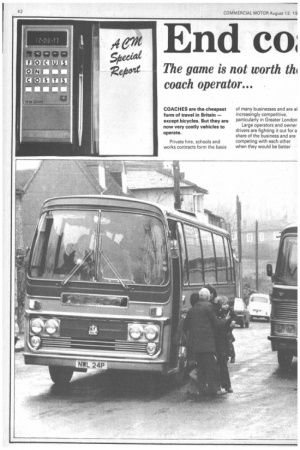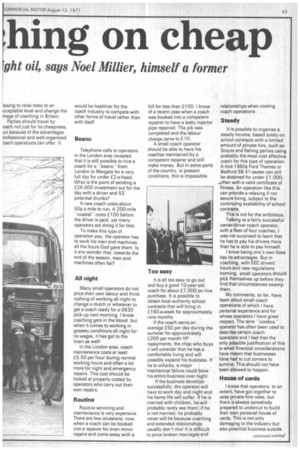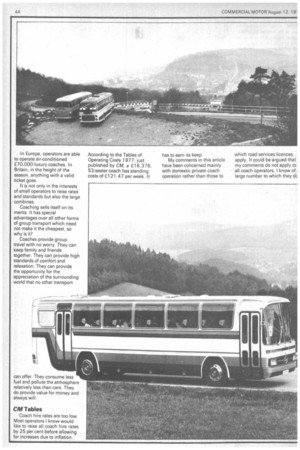End co, phing on cheap
Page 44

Page 45

Page 46

If you've noticed an error in this article please click here to report it so we can fix it.
Private hire, schools and works contracts form the basis of many businesses and are al increasingly competitive, particularly in Greater London Large operators and owner drivers are fighting it out for a share of the business and are competing with each other when they would be better iaising to raise rates to an icceptable level and change the mage of coaching in Britain.
Parties should travel by :oach not just for its cheapness, Kit because of the advantages yofessional and well-organised :oach operations can offer. It would be healthier for the coach industry to compete with other forms of travel rather than with itself.
Beano Telephone calls to operators in the London area revealed that it is still possible to hire a coach for a -beanofrom London to Margate for a very full day for under £2-a-head What is the point of sending a £24,000 investment out for the day with a driver and 53 potential drunks?
A new coach costs about 50p a mile to run. A 200-mile "coastal' costs £100 before the driver is paid, yet many operators are doing it for less.
To make this type of operation pay, the operator has to work his men and machines all the hours God gave them. Is it any wonder that, towards the end of the season, men and machines often fail?
All night
Many small operators do not price their own labour and think nothing of working all night to change a clutch or whatever to get a coach ready for a 0830 pick-up next morning. I know coaching gets in the blood, but when it comes to working in greasey conditions all night for no wages, it has got to the brain as well!
In the London area, coach maintenance costs at least £5.50 per hour during normal working hours and often a lot more for night and emergency repairs. This cost should be looked at properly costed by operators who carry out their own repairs.
Routine
Routine servicing and maintenance is very expensive. There are few occasions, now, when a coach can be booked into a repairer for even minor repairs and come away with a bill for less than £100. I know of a recent case when a coach was booked into a competent repairer to have a leaky injector pipe repaired. The job was completed and the labour charge came to £10. A small coach operator should be able to have his coaches maintained by a • competent repairer and still make money. But in some parts of the country, in present conditions, this is impossible.
Too easy
It is all too easy to go out and buy a good 10-year-old coach for about £7,000 on hire purchase. It is possible to obtain local authority school contracts that will bring in £180-a-week for approximately nine months.
If the coach earns an average £50 per day during the summer for approximately £200 per month HP repayments, the chap who buys it will consider that he has a comfortable living and will possibly expand his business. If he is unlucky, a major 'mechanical failure could blow his entire business over night.
If the business develops successfully, the operator will have to work day and night and his home life will suffer. If he is married with children, he will probably rarely see them; if he is not married, he probably never will be because coaching and extended relationships usually don't mix! It is difficult to price broken marriages and relationships when costing coach operations. . .
Steady
It is possible to organise a steady income, based solely on school contracts with a limited amount of private hire, such as Scouts and fishing parties using probably the most cost effective coach for this type of operation. A mid-1960s Ford Thames or Bedford SB 41-seater can still be obtained for under £1,000, .often with a valid certificate of fitness. An operation like this can provide a relaxing if not secure living, subject to the continuing availability of school contracts.
This is not for the ambitious.
Talking to a fairly successful owner-driver coach operator, with a fleet of four coaches, I was not surprised to learn that he has to pay his drivers more than he is able to pay himself.
I know being one's own boss has its advantages. But in coaching, with EEC drivers' hours and new regulations looming, small operators should pick themselves up before they find that circumstances swamp them.
My comments, so far, have been about small coach operations of which I have personal experience and for whose operators I have great respect. The term "cowboy" operator has often been used to describe certain coach operators and I feel that the only possible justification of this is when financial considerations have meant that businesses have had to cut corners to survive. This should not have been allowed to happen.
House of cards
I know that operators, to an extent, have got together to raise private hire rates, but there is always somebody prepared to undercut to build their own personal house of cards. This is not only damaging to the industry but also potential business suicide. In Europe, operators are able to operate air-conditioned E70,000 luxury coaches. In Britain, in the height of the season, anything with a valid ticket goes.
It is not only in the interests of small operators to raise rates and standards but also the large combines.
Coaching sells itself on its merits. It has special advantages over all other forms of group transport which need not make it the cheapest, so why is it?
Coaches provide group travel with no worry. They can keep family and friends together. They can provide high standards of comfort and relaxation. They can provide the opportunity for the appreciation of the surrounding world that no other transport can offer. They consume less fuel and pollute the atmosphere relatively less than cars. They do provide value for money and always will.
CM Tables
Coach hire rates are too low. Most operators I know would like to raise all coach hire rates by 25 per cent before allowing for increases due to inflation.
.According to the Tables of Operating Costs 1977, just published by CM, a £16,376, 53-seater coach has standing costs of £121,47 per week. It
has to earn its keep.
My comments in this article have been concerned mainly with domestic private coach operation rather than those to which road services licences apply. It could be argued that my comments do not apply to all coach operators. I know of large number to which they dc




















































































